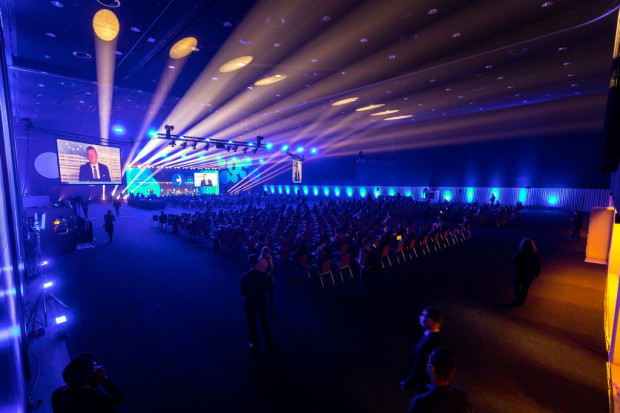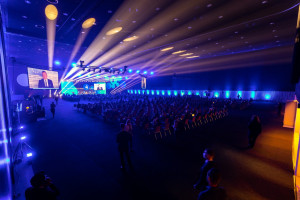The world after the pandemic, conversations about future trends, latest subjects and a thorough analysis of the economy – such is the summary of the 13th European Economic Congress and 6th European Tech and Start-up Days (held on 20-22 September, 2021) The organiser of the event, the PTWP Group, has provisionally scheduled next year’s edition of the largest business meeting in Central Europe for 25-27 April, 2022.
The 13th European Economic Congress and 6th European Tech and Start-up Days in figures: over 100 debates attended by 500 speakers in 3 days, around 9,000 registered participants, including 5,700 participants present in the International Congress Centre in Katowice. Thematic sessions and accompanying events were covered by representatives of over 100 press titles. Debates of the congress were viewed in real time 290,000 times.
„We are glad that so many representatives of the private sector decided to attend the 13th European Congress and 6th European Tech and Start-up Days. Over 120 partners supported us in organising this year’s edition of the event. The scale and popularity of the Congress are a proof that we are on the way back to normality, as far as the MICE industry is concerned. We want and we need live meetings during which we can establish relationships, initiate businesses, meet new people and utilize potential. Therefore, we are delighted to invite you to the 14th edition of the European Economic Congress scheduled for 25-27 April, 2022, in the International Congress Centre in Katowice,” says Wojciech Kuśpik, president of the PTWP Group, initiator and organiser of the European Economic Congress.
The inauguration session of the 13th Economic Congress (20th September, 2021) was devoted to the subject of an economy during recovery. The panellists discussed how we have changed after the pandemic, how it has influenced social consciousness. They also debated on new models of behaviour as well as the global and European economy. The green transition, the European Green Deal, international trade, economic relations, digitalisation and the consumer in the „new normality” were also high on the agenda of the 13th European Economic Congress.
„Co-creating an economy that can „thrive without the necessity to destroy the planet” may be beneficial to everyone. We need to cooperate, if we want to achieve this goal. We need entrepreneurs, investors, cities like Katowice. We need bold ideas. We can no longer base our economy on coal,” said Ursula von der Leyen, president of the European Commission, during the inauguration of the 13th European Economic Congress. „So, the question we face is not „whether our economy will transform”, but „how we can speed this process up,” she added.
„If the customer is king, then our planet is queen. If these two entities can co-exist, we have a happy royal marriage,” said Rafał Brzoska, president of InPost, during the European Economic Congress. „Delivering parcels to parcel lockers cuts CO2 emissions by 75% per each delivery. It goes without saying that if we do not change our behaviour in the 9 years to come and start acting in a more sustainable way, our grandchildren will inherit an inhospitable world,” he added.
„We want our clients to be able to buy whatever they need and our partners to achieve global success. Keeping prices low is another aspect. We want people buying on Amazon to be 100% sure they have got a bargain,” explained Mourad Taoufiki, general director at Amazon.pl during the European Economic Congress. Another factor is the convenience of shopping, including quick delivery. We want to have 10 centres here and use the entire infrastructure to meet all of our clients’ requirements,” he added.
„The meaning of the word „convenience” has changed.” Nowadays convenience means that everyone wants to feel special and know that the offer has been tailored to their needs. There is no other way to achieve it than by means of direct contact, e.g. through an app like ours,” said Tomasz Suchański, president of Żabka Polska. „6 million people use our application. It provides us with a lot of information about our customers and so we can offer them tailored solutions. For instance, we offer them beer when they are watching a football game. We can communicate directly with our customers and even Facebook does not provide this possibility,” he said at the 13th European Economic Congress in Katowice.
COVID has significantly changed consumers’ mood and behaviour. E-commerce will continue to strengthen its position, we will also witness pressure on the last mile. „Right now we see that the main competitive advantages are experience and delivery. Logistics, the millstone around the neck of e-commerce, can now accelerate its growth,” says Jakub Gierszyński, e-commerce director at Sephora.
According to Karin Sköld, president of IKEA Retail, the Polish economy has performed outstandingly well in recent years. Optimistic forecasts for years to come are also to be appreciated.
„This year home has become more important than it ever was. Our homes have become the centre of our life in the pandemic. They are much more than just places where we sleep and eat. Our children stayed at home in order to learn and we have transformed our living rooms into offices. Which is why the sector of interior design is developing so rapidly,” highlighted Karin Sköld, president of IKEA Retail in Poland, during the session of 13th European Economic Congress titled „Foreign Investments”. „The Polish market is strong and important to us. We sometimes joke that IKEA is Made in Poland. At the moment, Poland is our second largest furniture manufacturer. The furniture produced in Poland is exported to 50 different markets,” she added.
Observing the behaviour of the customers is not enough, we need to trust data. Changes are best visible in them. Data analysis, analysis of customer’s behaviour in e-commerce, store, during their journey between channels is a high priority task today. We are ahead of a period of dramatic changes. „What is gone is gone and it will never come back,” said Jacek Kujawa, vice-president of the management board of LPP, during he sessions of the European Economic Congress titled „Trade in the digital era. Sustainable e-commerce”.
According to a report by the Polish Agency for Enterprise Development, the value of the global AI market will have reached 190 billion dollars by 2025, and by that time the solutions based on AI will have been implemented by as many as 97% of largest international companies. Polish companies use AI predominantly to analyse data and automate customer service, i.e. as chatbots and voicebots.
„The pandemic has accelerated the digital revolution by 7 years, and with AI companies can increase their productivity by as much as 30%. By 2024 the number of voice assistants will have risen to 8.4 billion, which is more less as many as the entire global population. But in order for these forecasts to be fulfilled, companies need to be ready for an internal revolution. Implementing bots requires preparing IT, customer service and analysis departments. Hence, it is so important to acquire new competences from the field of digital transformation, processes optimisation and artificial intelligence,” said Kamil Bargieł, CEO at SentiOne.
„The lack of investments on the part of small and medium enterprises, aiming to improve productivity, remains the fundamental problem of the economy. There has not been enough of these investments since 2014,” said Brunon Bartkiewicz, president of ING Bank Śląski.
Just as in the energy sector, valuations of companies from the energy sectors have nosedived. This, on the other hand, heralds changes in the energy mix. We are witnessing a positive change. Companies from the sector of new technologies make their debuts on the Warsaw Stock Exchange – so far we have seen the debut of Allegro or gaming companies. They are an opportunity for handsome returns for the investors,” pointed Paweł Borys, president of the Polish Development Fund.
„You no longer need to own, all you need to do is subscribe. The application of this model is no longer limited to media or insurances as it is gaining on popularity. The changing model of using goods and services was the subject of the session titled „Subscription economy.”
„The Polish embrace novel technologies," claimed Karol Sadaj, Country Head Poland, Aion Bank. „Aion Bank is a bank conceived in the form of subscription. Two years ago it was believed that physical contact with the client was crucial for building trust in the banking sector. This assumption proved to be false. Physical contact is important, but its virtual forms work well in finance,” he explained.
„We want to own less, because of the related costs of insurance or services. There is also an environmental factor – „you do not need to own in order to use”, insist environmental activists. Our model goes hand in hand with the principles of closed circuit economy,” highlighted Wojciech Rokosz, Co-founder, CEO at Plenti.
„My definition of influencer has remained unchanged from the very beginning. It signifies a credible and strong image, based on the values that I cherish. I have to admit I have been closely observing how the meaning of the term evolves. I hope we do not lose our credibility,” said Ewa Chodakowska, trainer, self-made businesswoman, pioneer in the fitness industry in Poland, during the 13th European Economic Congress. „Good communication with clients, listening to their needs, the ability to seek advice of experts and assertiveness (required to start cooperation with the right entities) are other elements of the recipe for success,” enumerated Chodakowska during the Influencer Marketing panel at EEC 2021.
Ideas for an investment and industries caught in a dead end were the subject of the thematic sessions of the European Tech and Start-up Days accompanying the European Economic Congress. Which industries have let the investors down? During the panel titled „Investing in the future” Adam Niewiński, co-founder, General Partner, OTB Ventures, named a few sectors that have gone out of date. „The drone market bites the dust. It turned out to be disproportionately smaller. The same is true of the market of 3D printing,” he said.
Marian Owerko, chairman of the supervisory board of Bakalland, founder and president of Uno Capital, claimed that high street stores will concede to their e-commerce competitors. „Such stores will disappear,” he said during the 13th edition of the European Economic Congress.
Ryszard Hordyński, strategy and communication director at Huawei Polska stated that although the hype surrounding drones is long over, it does not mean that drones manufactures will be stopped in their tracks. „Drones need to be fitted with artificial intelligence and be capable of connecting with the network quickly. Investing in companies operating in the sector of smart cities, green technologies and autonomous transport will pay dividends,” he continued.
Among those who shared their knowledge and experience during the 13th European Economic Congress and 6th European Tech and Start-up Days were: Andrzej Adamczyk, minister of infrastructure, Jerzy Buzek, member of the European Parliament, president of the European Parliament in the years 2009-2012, prime minister of the Republic of Poland in the years1997-2001, president of the Council of the European Economic Congress, Swiatłana Cichanouska, political activist, candidate for president of Belarus in the 2020 election, Jadwiga Emilewicz, member of parliament, minister of economic development and technology (2018–2020), deputy prime minister (2020), Jan Fischer, politician, prime minister of the Czech Republic in the years 2009-2010, deputy prime minister, minister of finances in the years 2013-2014, Jarosław Gowin, member of parliament, deputy prime minister, minister of development, labour and technology in the years 2020-2021, Natalia Hatalska, CEO, founder, infuture.institute, author of the blog hatalska.com, Zbigniew Jakubas, owner of the Multico capital group, Dawid Jakubowicz, president of Ciech, Małgorzata Jarosińska-Jedynak, secretary of state in the Ministry of Development Funds and Regional Policy, Ivanna Klympush-Tsintsadze, president of the Committe for Integration of Ukraine with the European Union, the Verkhovna Rada of Ukraine, deputy prime minister of Ukraine for European and Euro-atlantic integration in the years 2016-2019, Jarosław Niewierowicz, chief advisor to the president of Lithuania Gitanas Nausėda, Lithuania's minister of energy in the years 2012-2014, Tadeusz Kościński, minister of finances, development funds and regional policy, Monika Morawiecka, president of PGE Baltica, Adam Niedzielski, minister of health, Krzysztof Pawiński, president of Maspex, Iveta Radičová, sociologist, politician, prime minister of Slovakia in the years 2010-2012, minister of labour in the years 2005–2006, Przemysław Rosati, president of the Supreme Bar Council, Anna Rulkiewicz, president of LUX MED, chairman of the Health Care Employers association, Małgorzata Starczewska-Krzysztoszek, lecturer, Department of Political Economy, Faculty of Economic Sciences of the University of Warsaw, Sanjay Samaddar, president, general director of ArcelorMittal Poland, Maimunah Mohd Sharif, executive director, United Nations Human Settlements Program (UN-Habitat), Lucyna Stańczak-Wuczyńska, chairwoman of the supervisory board, BNP Paribas bank, Konrad Szymański, minister for European Union affairs, Maroš Šefčovič, vice-president for institutional relations and foresight, European Commission, Robert Tomanek, rector of Katowice Economic University in the years 2016-2020, deputy minister of development, labour and technology in the years 2020-2021, Gertruda Uścińska, president of the Social Insurance Institution.
The Ranking of Decarbonization Initiatives, featuring the most innovative and effective projects aimed at reducing the emission of greenhouse gases in the Polish economy, made its debut in the portfolio of the events accompanying the European Economic Congress. The event was also accompanied by subsequent editions of the Start-up Challenge, Top Communal Investments and the Investor without Borders competitions.
The European Economic Congress, since its first edition in 2009, has been organized by the PTWP Group. The Metropolis GZM and the city of Katowice co-hosted this year’s edition of the event.
The 13th edition of the European Economic Congress and the 6th edition of the European Tech and Start-up Days (20-22 September, 2021) were held in strict compliance with the current guidelines concerning health and safety.






